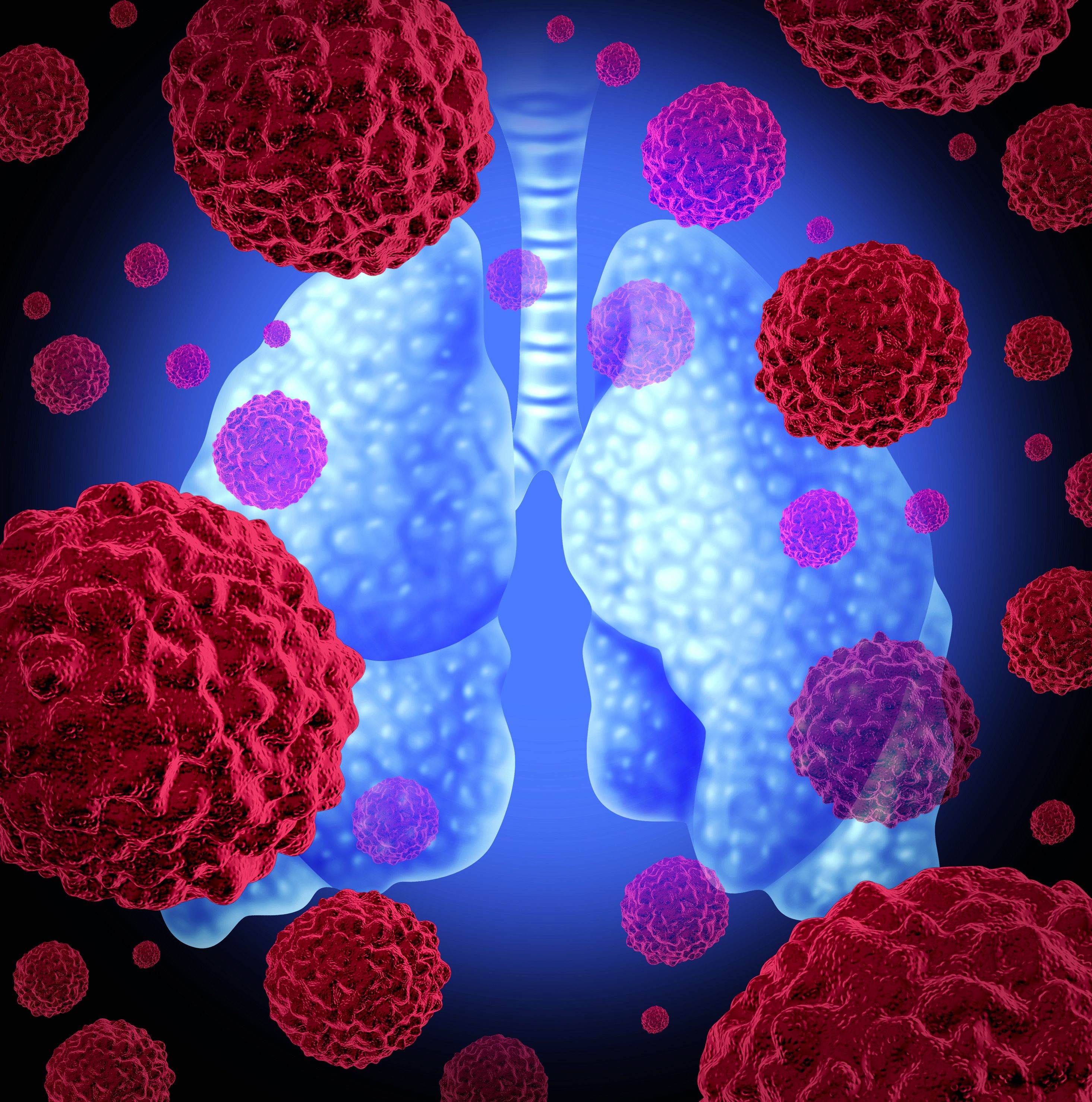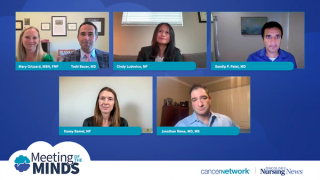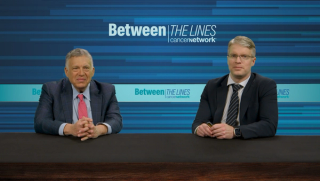
Non-Small Cell Lung Cancer (NSCLC)
Latest News
Latest Videos

More News

Data from the INCITE-ES study show 100% technical success with pulsed electric field energy delivery before surgical resection.

Given an unmet need for efficacious therapies against ALK-positive NSCLC, experts discuss optimal ALK TKI sequencing for patients with this disease.

COCOON in Practice: Patient Preparation, Key Insights, and Implementation Best Practices
Panelists discuss how proactive management of adverse effects through the COCOON protocol represents a paradigm shift that could be applied to other EGFR inhibitors, emphasizing early intervention before symptoms appear.

Operational Considerations: Workflow Adjustments and Monitoring Systems for Effective COCOON Implementation
Panelists discuss how implementing standardized order sets in electronic medical records and providing printed patient education materials can help streamline the COCOON protocol implementation.

Perioperative Nivolumab Combo Earns EU Approval in PD-L1+ Resectable NSCLC
Findings from the CheckMate 77T study support the approval of this nivolumab-based regimen in the European Union.

Telisotuzumab Vedotin Earns FDA Accelerated Approval in c-MET+ NSCLC
Data from the phase 2 LUMINOSITY study support the FDA approval of telisotuzumab vedotin in this non–small cell lung cancer population.

Building Support Systems: Resources and Multidisciplinary Collaboration for Optimizing COCOON Implementation
Panelists discuss how keeping management of dermatologic adverse effects “in-house” with oncology teams is often preferable to referring patients to dermatologists, though some patients occasionally benefit from specialized care for nail issues.

Measuring Impact: Observed Differences in Dermatologic AEs Between COCOON Protocol and Standard Approaches
Panelists discuss how regular monitoring, patient education about reporting symptoms promptly, and visual assessment during biweekly visits are essential for effectively managing dermatologic adverse events.

Lorlatinib Yields Distinguishing CNS Benefit in ALK-Positive NSCLC
Treatment with lorlatinib might be effective regardless of the presence of central nervous system metastases, according to Misako Nagasaka, MD, PhD.

Mitigating CNS Events Is “Key” With Lorlatinib for ALK-Positive NSCLC
Most central nervous system events with lorlatinib were grade 1 or 2 in the phase 3 CROWN trial.

Lorlatinib Yields No Unexpected Toxicities in ALK-Positive NSCLC
Treatment with lorlatinib did not increase cardiovascular events among patients with ALK-positive non–small cell lung cancer in the CROWN trial.

Lorlatinib Demonstrates “Fantastic” PFS Results in Advanced ALK+ NSCLC
At 5 years, 60% of patients who received lorlatinib in the phase 3 CROWN study achieved progression-free survival.

Clinician Experiences: COCOON Regimen vs Traditional SoC AE Management
Panelists discuss how the standardized COCOON regimen offers clear guidance for managing dermatologic adverse effects, with specific components such as clindamycin lotion for the scalp and chlorhexidine wash for nails showing effectiveness.

Initial Reactions to COCOON Study’s Dermatologic/Nail AE Reductions
Panelists discuss how patients have been receptive to the proactive management approach that effectively reduces dermatologic adverse effects, despite initial concerns about adding multiple prophylactic interventions.

Divarasib Combo Appears “Promising” in Pretreated KRAS G12C+ NSCLC
Ongoing ctDNA analysis may elucidate outcomes associated with divarasib plus migoprotafib for those with KRAS G12C–positive NSCLC.
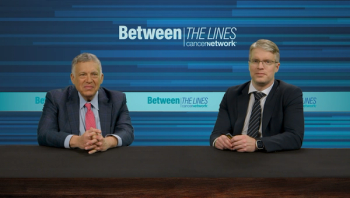
Looking Ahead and Key Takeaways in EGFRm NSCLC
Panelists discuss how overcoming resistance mechanisms in EGFR-mutated non–small cell lung cancer (NSCLC) remains a key unmet need, with future research focusing on targeting these mechanisms, exploring new drug combinations, and optimizing treatment sequences to improve patient outcomes.

Assessing the Adverse Effect Profile of Ami-Laz in Comparison With Other Combination Therapies in EGFRm NSCLC
Panelists discuss how the adverse effect profile of amivantamab plus lazertinib (ami-laz) compares with other combination therapies, emphasizing its balance between therapeutic efficacy and quality of life, and how this influences decision-making in treatment selection.

COCOON: Discussion of Clinical End Points and Dose Modifications
Panelists discuss how the COCOON dermatologic management protocol significantly reduced grade 2 or higher dermatologic adverse events in multiple locations, particularly on the face/body (23% vs 62%), scalp (9% vs 29%), and nails (16% vs 21%).

COCOON Baseline Characteristics
Panelists discuss how the baseline characteristics of patients in the COCOON trial were evenly matched, with slightly more women than men and a significant number of Asian patients, which is typical for EGFR-mutant non–small cell lung cancer.

Analysis of MARIPOSA & SKIPPirr Trials: Safety and Quality of Life
Panelists discuss how targeted cancer therapies, particularly those affecting the EGFR and c-MET receptors, present unique adverse effects such as dermatologic reactions and venous thromboembolism, emphasizing the importance of proactive management, patient education, and evolving treatment strategies to balance efficacy with quality of life.

Panelists discuss how intracranial progression-free survival (PFS) and duration of response (DoR) influence treatment decisions, highlighting the significance of intracranial data in differentiating this regimen within the treatment landscape, its potential impact on brain metastases management, and the role of radiation therapy in clinical practice.
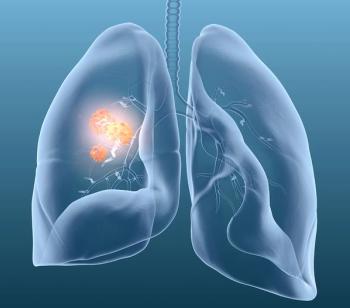
The phase 3 HARMONi-6 trial found invonescimab plus chemotherapy improved PFS vs tislelizumab plus chemotherapy in squamous NSCLC.

Overview of Study Design of the COCOON Trial
Panelists discuss how the COCOON trial demonstrated that enhanced dermatologic management significantly reduced grade 2 or higher skin-related adverse events (38% vs 76%) compared with standard of care for patients receiving amivantamab plus lazertinib.

Clinical Insights: Experiences With Amivantamab-Lazertinib in EGFR-Mutant NSCLC
Panelists discuss how amivantamab plus lazertinib therapy for EGFR-mutant non–small cell lung cancer has shown promising survival data while highlighting the importance of managing adverse events for improved quality of life.

In first-line, EGFR-mutated NSCLC, targeted therapies such as osimertinib or amivantamab plus lazertinib are recommended.



